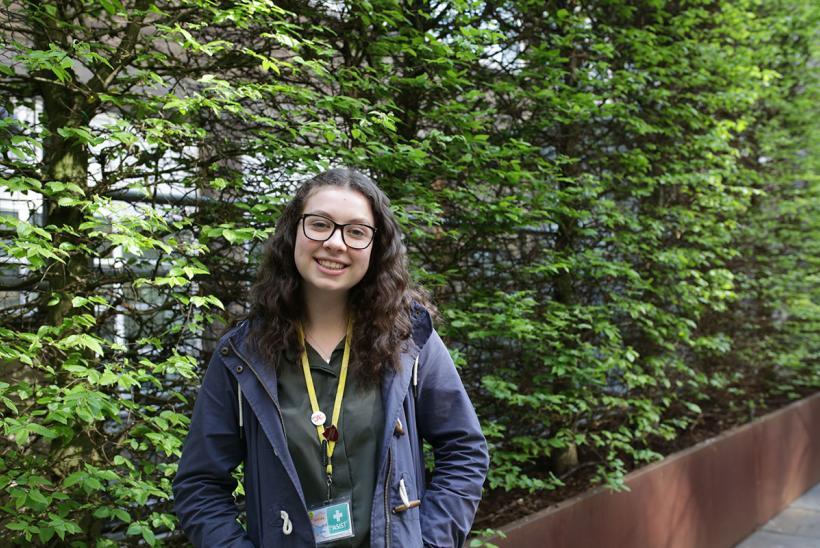Katie's story
Katie was a healthy teenager out shopping with her sister when she had a seizure that lasted two hours. She was rushed to her local hospital but had to be transferred to intensive care at Great Ormond Street Hospital for Children (GOSH) for specialist care.
After numerous tests, she was eventually diagnosed with encephalitis – a life-threatening swelling of the brain. Katie is now preparing for a future as a paediatric nurse, inspired by the care that she received from GOSH nurses on Koala Ward.
Specialist care
“One of the things that makes my illness so tricky is that I’m not aware that I’m getting ill. I was probably ill six to nine months before my first big seizure,” says Katie. “Some of the signs are being aggressive and having panic attacks, my handwriting gets messy, I find it difficult to concentrate and my audio processing goes out the window.”
Katie was a healthy teenager when she had a seizure that lasted two hours; she was rushed to her local hospital. Katie went on to experience more seizures at her local hospital. Her medical team decided that she needed specialist care and she was transferred to the intensive care unit at GOSH.
“You never think that anything bad will happen to you, until it does. Being diagnosed with a life-threatening condition is terrifying, but as soon as you get to GOSH, you know you’re safe. GOSH is my safe place,” Katie explains.
“It’s a blessing that I can’t remember most of what happened to me. The only thing I remember of my time in intensive care are vivid dreams, which were based on the things around me. I was there, but I wasn’t there. They call it a delirium.”
While uncommon, encephalitis can be life threatening and prompt treatment is need to reduce the swelling and make sure there is no permanent damage. But diagnosis is complicated because encephalitis can be caused by lots of different things. Katie remembers how stressful going through tests can be.
“My condition is really rare,” says Katie. “I was told that my diagnosis was a process of elimination. They did hundreds of tests, including CT and MRI scans, lumbar puncture, EEG and blood tests.”
Managing the condition
“My type of encephalitis is caused by something going wrong with my immune system. Even though there was so much uncertainty around my condition and treatment, I knew I was in a special place at GOSH and that gave me a sense of security,” says Katie. “I’ve had to learn to manage my expectations and prioritise my health, and that’s quite hard when you’re a teenager.”
Today, Katie experiences continuing seizures which have to be controlled with medicine, but that doesn't put her off living a normal life as a bright and ambitious teenager.
"As you become better, it's that adapting to your illness, and learning to be brave enough to go out on the street even though you might have a seizure,” she says.
A year and a half after being hospitalised, Katie lost some of her eyesight, and is now unable to see all of her field of vision. "It was quite scary when I started to lose my sight. Despite all my health issues, this was the one factor that contributed enormously to my mental health. It went downhill, quite significantly after that.
“I was sixteen and I hadn't started to process any of my health problems until I lost my sight. I was in sixth form, being held back a year, all my friends had left. It was tough."
Due to her own experiences, Katie is working towards improving mental health provision at her school. She also volunteers for the St John's Ambulance.
“I've taken all my grief and my pain from my illness, I've put it into mental health stuff at my school, and I love that. I've done two courses - suicide safe talk is making yourself aware of what language that people who are thinking about suicide might use. And a suicide assist training course is deciding what to do if someone's imminently about to take their own life. That was a really hard training weekend. I've worked really hard, and it's really helped me. It's given me a focus.”
Life after GOSH
Now 19 years old, Katie is preparing for a future as a paediatric nurse, inspired by the care that she received from GOSH nurses on Koala Ward. She has applied to study children's nursing at university in September. “Dr Robinson, and all the nurses at GOSH inspired me to choose this career path. They cared for me at my most vulnerable and I would love to help other patients going through similar experiences.
“Every night someone would come in and check that I was okay, not just blood pressure and temperature, but to check I was okay before I got to sleep. That sense of care is amazing, and that's an amazing thing to be able to give someone.
“I loved the way that the nurses would try to find the similarities between you and them. When you’re a nurse, and you’re looking after an incredibly ill child, the similarity you have is the hospital. They would try to find similarities outside of the hospital and get to know you as a person. All the staff become such a huge part of your life. I cried so much during my last appointment with my doctor, Dr Robertson. I had all the nurses in the room to say goodbye. It was very emotional; I wouldn’t have a life without them."
"GOSH has taught me to put one foot in front of the other and be grateful for everything you have. I’m brave, mature and responsible, and GOSH has given me that.”

